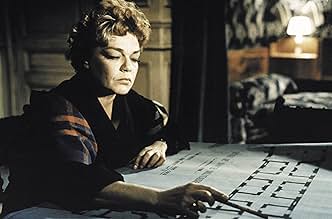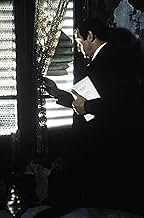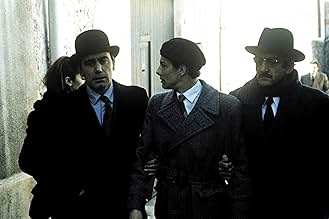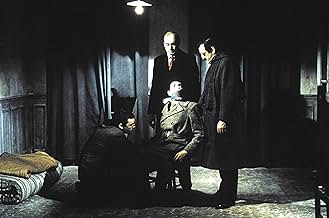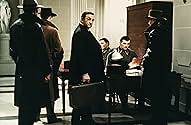Francia, 1942. Philippe Gerbier è un leader della resistenza francese. Attraverso i suoi occhi vediamo la resistenza con gli intrighi e lo spionaggio, la costante minaccia di essere catturat... Leggi tuttoFrancia, 1942. Philippe Gerbier è un leader della resistenza francese. Attraverso i suoi occhi vediamo la resistenza con gli intrighi e lo spionaggio, la costante minaccia di essere catturati dai tedeschi e le decisioni difficili.Francia, 1942. Philippe Gerbier è un leader della resistenza francese. Attraverso i suoi occhi vediamo la resistenza con gli intrighi e lo spionaggio, la costante minaccia di essere catturati dai tedeschi e le decisioni difficili.
- Regia
- Sceneggiatura
- Star
- Premi
- 4 vittorie e 1 candidatura in totale
Recensioni in evidenza
It's basically as if Melville, having lived through the period- this being perhaps an even more personal film than his other crime films- still takes on some of the true knacks of what he does in the rest of his oeuvre. Taking characters who go by codes of loyalty, professional as can be, and in a true underground in society. However this time their opponent being the Germans instead of the police the stakes are raised. Even as a couple of parts in the middle seem to shake with the deliberate pace Melville sets a couple of times, the main core of the story and the characters is remarkable, and honest in a dark, bleak way.
Lino Ventura is at his best as Gerbier, a main man in the French resistance movement, who gets more involved in the proceedings following a brief prison-camp stint (the escape from which is one of the most daring in any film). The film is fairly episodic, however encompassing a group of the resistance people, including Mathilde (Simon Signet, very good as always), Le Masque (Claude Mann), and Jean-Francois (Jean-Pierre Cassel, at a peak as well in his own way).
Some of their operations are simple, like retrieving weapons or finding more support through certain channels. Though here and there some payback is in due to the traitors. This becomes a higher issue as the film rolls into its final act, as alliances come into question, and the real ties of humanity together are tested in the midst of the German occupation.
As usual with Melville all of this is told, in its own way, fairly simply- almost clinically- by Melville's camera. There are some zooms here and there, some very intense camera positions (though not awkwardly), and exciting when need be. At the same time, there are some scenes like a short scene on a beach (all blue) or a few others at night or in different lighting modes that are the best Melville's done in the midst of a color scheme used perfectly to correspond with the mood; it works just as well if not better than how he uses it for his crime films.
But one of the pleasures of seeing a film like this by a real kind of maverick of European cinema is seeing how much room he gives for his actors. These are not performances that become over-sensational in the slightest. On the contrary, what adds sometimes to the tension in some of the scenes, or the outright tragedy, is how the actors just play as they do professional-wise, sometimes with what's not said meaning more (and how the Melville gets these quiet moments is fantastic). Featuring a superlative musical accompaniment by Eric De Marsan, this is one of the best directed anti-war films ever made.
'L'armee des ombres' (aka The Shadow Army) is Jean Pierre Melville 1969 masterpiece and does not deal with gangsters. The film is a mix of the director's war time experiences in the French Resistance and Joseph Kessel successful wartime novel. What is remarkable about this film is that Melville turned a mosaic of anecdotes that Kessel's novel is all about into a great, dark epic.
From the chilling opening shot of Germans marching down the Champs-Elysées to the final scene involving the fellow Resistant Mathilde (the great Simone Signoret) the film seems to demonstrate that fighting for an ideal often leads towards death and solitude. What Melville does successfully is to show those dead-ends the way they occur to their protagonist (very simply and minimalist), however more than showing them Mr. Melville managed to make these realities (death and solitude) an equally tragic experienced for the audience...
'L'armee des ombres' is Melville's most moving film, a monument to the spirit of the Resistance rather than its actuality. A poignant drama with a strong performance from not only Lino Ventura but also Simone Signoret, Paul Meurisse, Jean Pierre Cassel, Claude Mann, Paul Crauchet to name a few.
This is probably Melville's greatest cinematographic achievement and, when fiction becomes reality, when actors leave behind their egos to resurrect into heroes, when the colors of the film mirror the one of the soul and when silence becomes music, true cinema has been achieved 'L'armee des ombres' is a terrible yet powerful experience in which the words duty, courage, abnegation get charged with meaning
The film is lacking any of that championing of the underdog spirit that infuses so many other stories about scrappy groups resisting the tyranny of the powerful. The members of the French Resistance in this film live like unearthly beings, skittering from one shadowy doorway to another, trying to erase any sign of themselves. The movie suggests that this need for non-existence bleeds into their psychology as well -- the film's main character becomes nearly inhuman in his devotion to the cause and his ability to ruthlessly do away with colleagues when there's a chance that one of them might jeopardize the others. He's not inhuman, but he must do inhuman things, because the desperation of his and his comrades' situations calls for it.
The Criterion Collection's print of the film looks terrific, or at least as terrific as the film's dreary pallet of grey and brown will allow. Melville gives the film an authentic look -- only some scenes set in the London blitz and on an aircraft carrier have a studio set look to them.
A shot of the Arc di Triomphe both opens and closes the film: a symbol of the France that would eventually emerge from the dark days of WWII, or an ironic jab at a country that can't take much credit for fighting off the tyranny of fascism?
Grade: A
Lo sapevi?
- QuizCinematographer Pierre Lhomme claimed that the last surviving, watchable print of the movie had turned completely pink with age. He later supervised the 2k resolution, digital restoration of the film at the Eclair Laboratories in Paris.
- BlooperIn the London WWII sequence, double yellow lines are visible on the road. These were only introduced in the UK in 1956 and didn't become common until the 1960s; a few of the street signs have a style not known before the 1960s.
- Citazioni
Philippe Gerbier: See you, Comrade.
Legrain: You a communist?
Philippe Gerbier: No. But I do have comrades.
- ConnessioniFeatured in Mémoires pour Simone (1986)
I più visti
Dettagli
- Data di uscita
- Paesi di origine
- Lingue
- Celebre anche come
- El ejército de las sombras
- Luoghi delle riprese
- Bunker de l'armée, Saint-Cyr-l'Ecole, Yvelines, Francia(execution by the Gestapo)
- Aziende produttrici
- Vedi altri crediti dell’azienda su IMDbPro
Botteghino
- Lordo Stati Uniti e Canada
- 861.983 USD
- Fine settimana di apertura Stati Uniti e Canada
- 12.620 USD
- 30 apr 2006
- Lordo in tutto il mondo
- 931.732 USD





